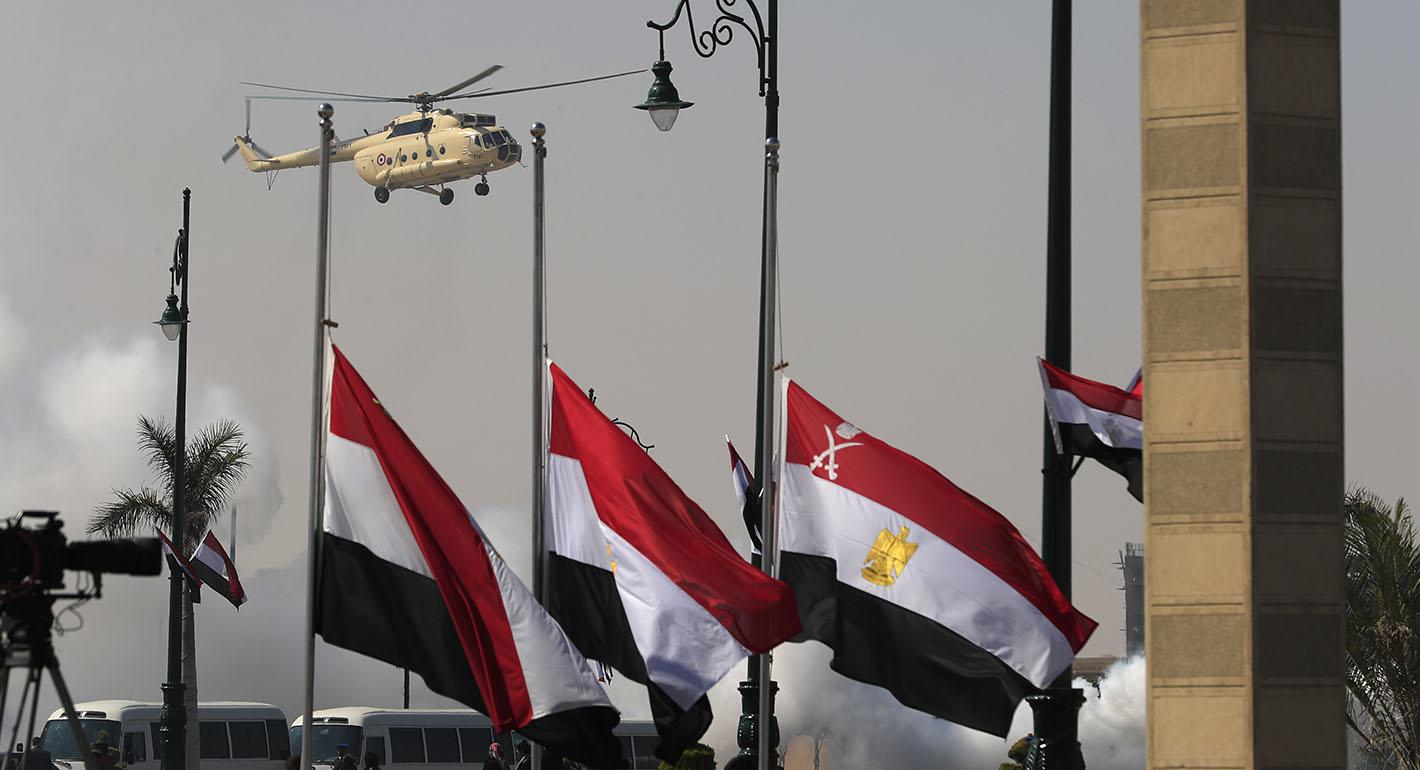Arms supplies from Russia to Iran will not only continue, but could grow significantly if Russia gets the opportunity.
Nikita Smagin

Source: Getty
The successful completion of Egypt’s 2016 IMF program is superficial, hiding poor economic growth relative to emerging market peers and an economy burdened by a military-led public sector.
In mid-2019, Egypt received the last $2 billion installment of the $12 billion loan extended by the International Monetary Fund (IMF) in 2016, successfully completing their agreed program. The IMF’s final review of Egypt’s reforms that formed the basis for approving the final disbursement was less than fully convincing, however. The Egyptian economy relies heavily on the military-led public sector, which has proven unable to provide the long-term, quality growth necessary to pull millions out of poverty.
To be fair, Egypt did implement reforms that had remained anathema to previous Egyptian governments. These included freeing the exchange rate (even if for a period only), slashing fuel and food subsidies, implementing specific belt-tightening measures, and hiking interest rates to offset the inflationary impact of the devaluation. A good start was also made on reforming the business environment by modernizing a few laws and regulations, but this limited progress does not explain why the Egyptian economy lags so far behind that of its emerging market peers.
The IMF agreement also energized the government of President Abdel Fattah el-Sisi, implementing grand infrastructure projects and turning to the international investment community with renewed confidence. The discovery of a giant gas field within Egypt’s international borders in the Mediterranean at the start of the IMF-funded program provided a nice fillip. The official reaction from friendly Gulf countries and from Europe was highly positive and brought in more funds. More importantly, emerging markets investors, swimming in a sea of low or negative interest rates, flocked to Egyptian treasury bonds that promised double digit returns (with minimal post-devaluation exchange rate risk) and to its Eurobond offerings with mid-to-high single digit rates. Suddenly, Egypt became one of the most popular destinations for short-term capital flows in international markets.
The return of stability after the unsettling turmoil of the Arab Spring and its aftermath helped resurrect some tourism and spur private sector activity connected with the government’s infrastructure projects. Economic growth recovered to above 5 percent and employment prospects improved. As the program approached its conclusion, the fiscal deficit had narrowed, and inflation declined dramatically from its post devaluation spike.
Viewed through the prism of the IMF and international financial markets, the Egypt program was reasonably successful as it both helped remove important macroeconomic imbalances and distortions and stabilized financial conditions. The program, however, fell short of the one fundamental goal that Egypt and the IMF had emphasized from the start: to wean the Egyptian economy off its dependence on the public sector and turn it into a market driven, private sector–led economy.
In the Egyptian context, this goal essentially required a gradual reduction in the direct role of the powerful military establishment in important sectors of the economy. While one could understand the IMF’s reluctance to take on such a transformational change (presumably, that was a job for the World Bank), the Sisi government simply ignored the whole issue and proceeded to further expand both the scope and the visibility of the military in the economy.
Taking a broad historical view of Egypt’s economic development, the military coup in 1952 reversed a century of capitalistic development in Egypt and ushered in a strategy of state-led development based on a fiercely anticolonial posture externally and a populist agenda internally. The latter essentially meant the nationalization of industry, extensive land redistribution programs, and highly progressive income and wealth taxation.
In addition, being led by young officers who had personally experienced Egypt’s humiliating defeat in Palestine in 1948‒1949, the new government established a Ministry of Military Production and set out to affirm an important role for the military in the economy. Subsequent wars with Israel and the institution of a state of national mobilization only expanded this role. Following the peace agreement with Israel in 1978, the armed forces were given a direct role in undertaking profitable activities as an offset to the on-budget cuts in military spending made more to impress donors than to downsize the military. Some of the military spending was moved off-budget while the military found new sources of revenue by engaging in economic activity.
As the military grew more entrenched, its influence in the economy grew steadily, including in the production of goods and services such as cement, steel, home appliances, and tourism, while remaining largely exempt from competition with the private sector and, in many instances, even benefiting from tax and other advantages. Since 2013, Sisi has further expanded the role and special privileges of the military. For example, legislation passed in 2014 and renewed in 2016 placed all “public and vital facilities” under military jurisdiction until 2021, when the law will likely be renewed. The role of the military in exploiting public lands (and in regulating private sector access to such lands) was further strengthened, expanding opportunities for rent-seeking and large-scale corruption.
To be sure, other developing countries in the early years of the postcolonial era yielded political power to the military, such as China, South Korea, Turkey, Indonesia, and several Latin American countries. However, in time, most countries reestablished civilian primacy, often with constitutional safeguards, while also providing strong legal and institutional frameworks for a more liberal and open economic system. For the past nearly seven decades, however, Egypt has not experienced such a transformation.
In Egypt, in addition to direct control by the military, important sectors of the economy have remained under the indirect influence of the security establishment through a vast network of retired senior officers who occupy high managerial positions or sit on company boards throughout the sprawling public enterprise sector and in parts of the private sector. The majority of regional governments and almost all public authorities (in maritime transport, aviation, railways, and the Suez Canal) have been headed by former generals or other high-ranking retired officers for decades. This network of retired military officers helps ensure that major policy initiatives and strategic decisions by private sector firms remain within parameters set by the military. This is a principal reason why serious privatization, except during a brief period in the mid-2000s, has never caught traction in Egypt.
Egypt’s economic performance in recent decades has lagged compared to emerging market peers. In 1988‒2018, Egypt’s real GDP per capita barely doubled, reaching less than $3,000, whereas for the group of widely tracked emerging markets, the same metric grew about five times, to $5,250. More strikingly, whereas Egypt and South Korea were at comparable levels of development in the 1950s, by 2018 South Korea’s real GDP per capita had grown to more than ten times that of Egypt, to about $35,000. Furthermore, even Egypt’s modest growth was not equitably shared among the population. Poverty rates in Egypt far exceed those in peer countries, while unemployment among females and among youth is double that of the general population, itself chronically high.
The dominant and privileged status of the public sector, and especially the military, in the economy is a principal reason why Egypt has largely failed to develop a dynamic and innovative private sector and to fully modernize and globalize its economy. For example, employment in the public sector in Egypt currently exceeds 6 million people (excluding the armed forces of nearly 1.5 million), or more than 22 percent of the country’s labor force, in contrast with around 13 percent in Turkey and less than 9 percent in South Korea. The economic size of the public sector in Egypt was estimated at 31 percent in 2017, about 2‒3 times the average in leading emerging economies. Public sector companies operate under a regime of privilege where they rarely compete with the private sector and remain protected from foreign competition, thus breeding inefficiencies and overstaffing.
Since the early 1970s, opening up world trade and large flows of capital, technology, and talent have helped many emerging and developing countries develop new industries, adopt new technology, and expand their trade in global markets. Egypt, in contrast, has kept much of its economy relatively closed, in part due to the resistance of the state sector bent on resisting market driven reforms and preserving its privileges. Thus, during the dynamic decades of globalization and exploding world trade (the 1980s to the mid-2000s), Egypt chose to depend on the economic rent it could extract from such special advantages as newly discovered hydrocarbon resources, a unique legacy of tourist sites, worker remittances from Gulf countries, trade through the Suez Canal, and official transfers often given as a reward for geopolitical considerations (such as maintaining peace with Israel and joining the U.S.-led alliance in the first Gulf War).
After an initial spurt at the start of the IMF-supported program, private investment has begun to decline and growth to slow. Short-term international capital has also declined while foreign direct investment outside the hydrocarbons sector (in other words, projects that bring in skills and technology and create jobs) remained negligible. The positive effects of the IMF-supported reforms are therefore likely to be superficial and Egypt’s deeply entrenched structural weaknesses to remain.
Against this background, a fundamental question about Egypt’s economic future becomes acute. The military-led political leadership of Egypt has maintained total control of the social and economic development of the country for decades. How will they explain the country’s failure, in contrast to its emerging markets peers, to achieve high and sustainable rates of economic growth, to reform its bureaucracy and state institutions, to lift millions out of poverty, and to provide the freedom and dignity that come with a better quality of life for its people?
George Abed is a distinguished scholar at the Institute of International Finance and former director of the Middle East and Central Asia Department at the IMF.
George T. Abed
Carnegie does not take institutional positions on public policy issues; the views represented herein are those of the author(s) and do not necessarily reflect the views of Carnegie, its staff, or its trustees.
Arms supplies from Russia to Iran will not only continue, but could grow significantly if Russia gets the opportunity.

Nikita Smagin
On the fourth anniversary of Russia’s full-scale invasion, Carnegie experts discuss the war’s impacts and what might come next.



Eric Ciaramella, Aaron David Miller, Alexandra Prokopenko, …
For climate-focused civil society in countries like Morocco, Algeria, and Tunisia to be most effective, organizations should work together to develop networks that extend their reach beyond their local area and connect across borders to share best practices and amplify each other’s work.

Sarah Yerkes
The recent African Cup of Nations tournament in Morocco touched on issues that largely transcended the sport.


Issam Kayssi, Yasmine Zarhloule
Putin is stalling, waiting for a breakthrough on the front lines or a grand bargain in which Trump will give him something more than Ukraine in exchange for concessions on Ukraine. And if that doesn’t happen, the conflict could be expanded beyond Ukraine.

Alexander Baunov